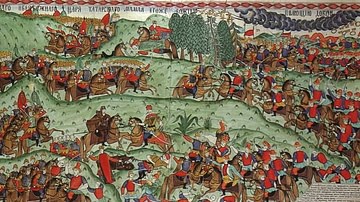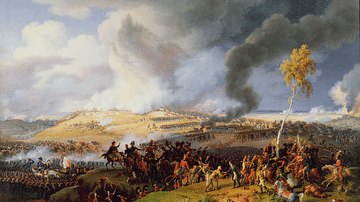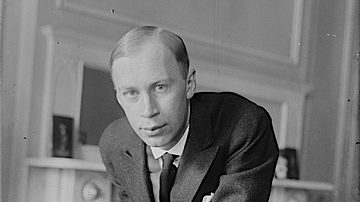Search
Did you mean: Susa?
Search Results

Definition
Continental System
The Continental System was a major blockade of British trade imposed by French Emperor Napoleon I from 21 November 1806 to 11 April 1814. It was designed to cripple the British economy, thereby forcing Britain out of the Napoleonic Wars (1803-1815...

Definition
Moroccan Crises - German v. French Imperialism
The Moroccan Crises were two international incidents, the first in 1905-6 and the second in 1911, when Imperial Germany, eager to expand its empire, threatened France's presence in Morocco. France's position was supported by Britain and Russia...

Article
The Grand Embassy of Peter the Great
The Grand Embassy was the name given to the long Western European tour that Tsar Peter I of Russia (aka Peter the Great, r. 1682-1725) undertook during 1697-1698. Peter was joined by hundreds of people, including noblemen, his friends, volunteers...

Definition
Napoleon Bonaparte
Napoleon Bonaparte (1769-1821) was a Corsican-born French general and politician who reigned as Emperor of the French with the regnal name Napoleon I from 1804 to 1814 and then again briefly in 1815. He established the largest continental...

Definition
Golden Horde
The Golden Horde was the European appanage of the Mongol Empire (1206-1368 CE). Begun in earnest by Batu Khan in 1227 CE, the territory that would eventually become the Golden Horde came to encompass parts of Central Asia, much of Russia...

Definition
War of the Second Coalition
The War of the Second Coalition (1798-1802), part of the broader French Revolutionary Wars, was the second attempt by an alliance of major European powers to defeat Revolutionary France. The Second Coalition, which included Russia, Austria...

Article
The Role of Workers' Soviets in the Russian Revolutions
Soviets, often called Soviets of Workers' Deputies, were worker councils first formed during the Russian Revolution of 1905 when a general strike was called against the Tsarist regime. Factory and other types of workers across the newly industrialised...

Article
Battle of Borodino
The Battle of Borodino (7 September 1812) was a major battle fought during Napoleon's invasion of Russia. It saw the French Grande Armée of Emperor Napoleon I (r. 1804-1814; 1815) narrowly defeat an imperial Russian army under Mikhail Kutuzov...

Definition
Kievan Rus
Kievan Rus (862-1242) was a medieval political federation located in modern-day Belarus, Ukraine, and part of Russia (the latter named for the Rus, a Scandinavian people). The name Kievan Rus is a modern-day (19th century) designation but...

Definition
Sergei Prokofiev
Sergei Prokofiev (1891-1953) was a Russian composer (born in Ukraine) who was at the forefront of the Modernist music movement. His symphonies, orchestral suites, and ballets display endless variety and complexity. His most famous works today...